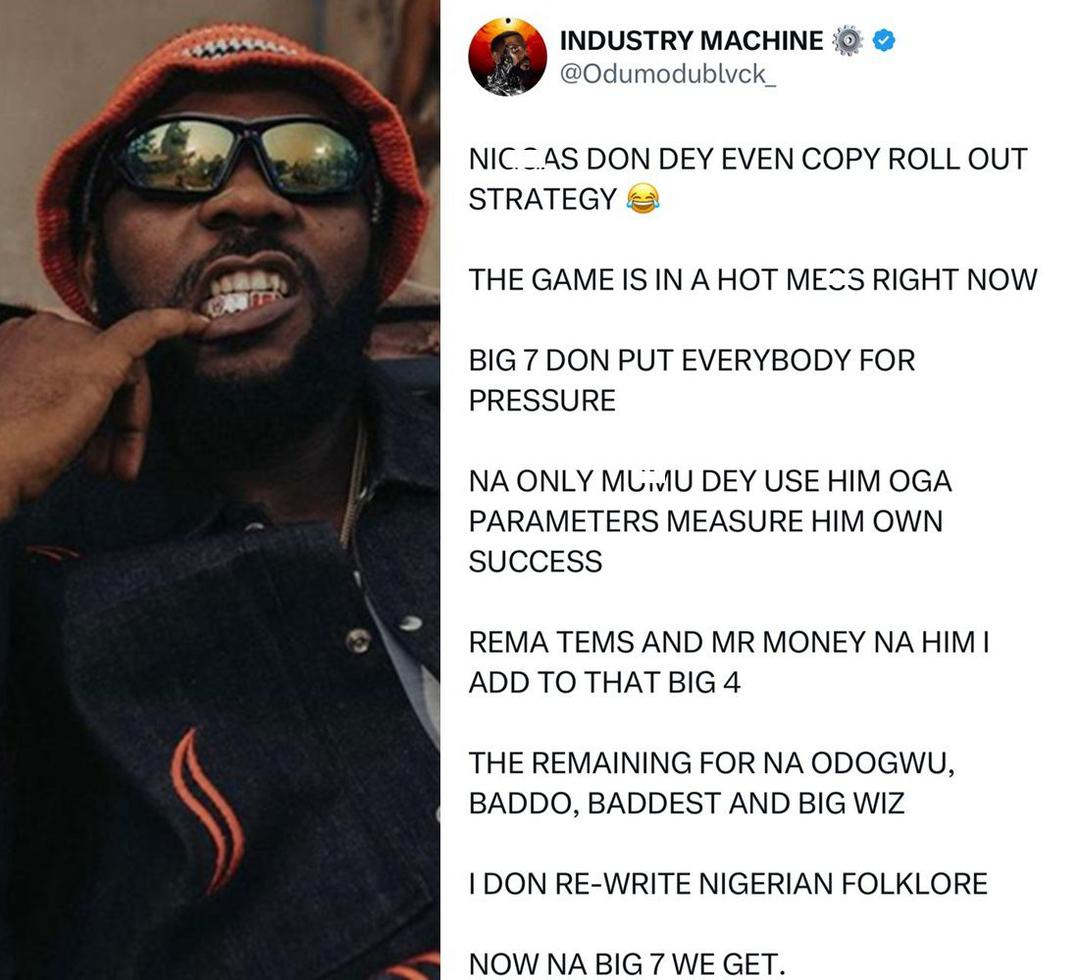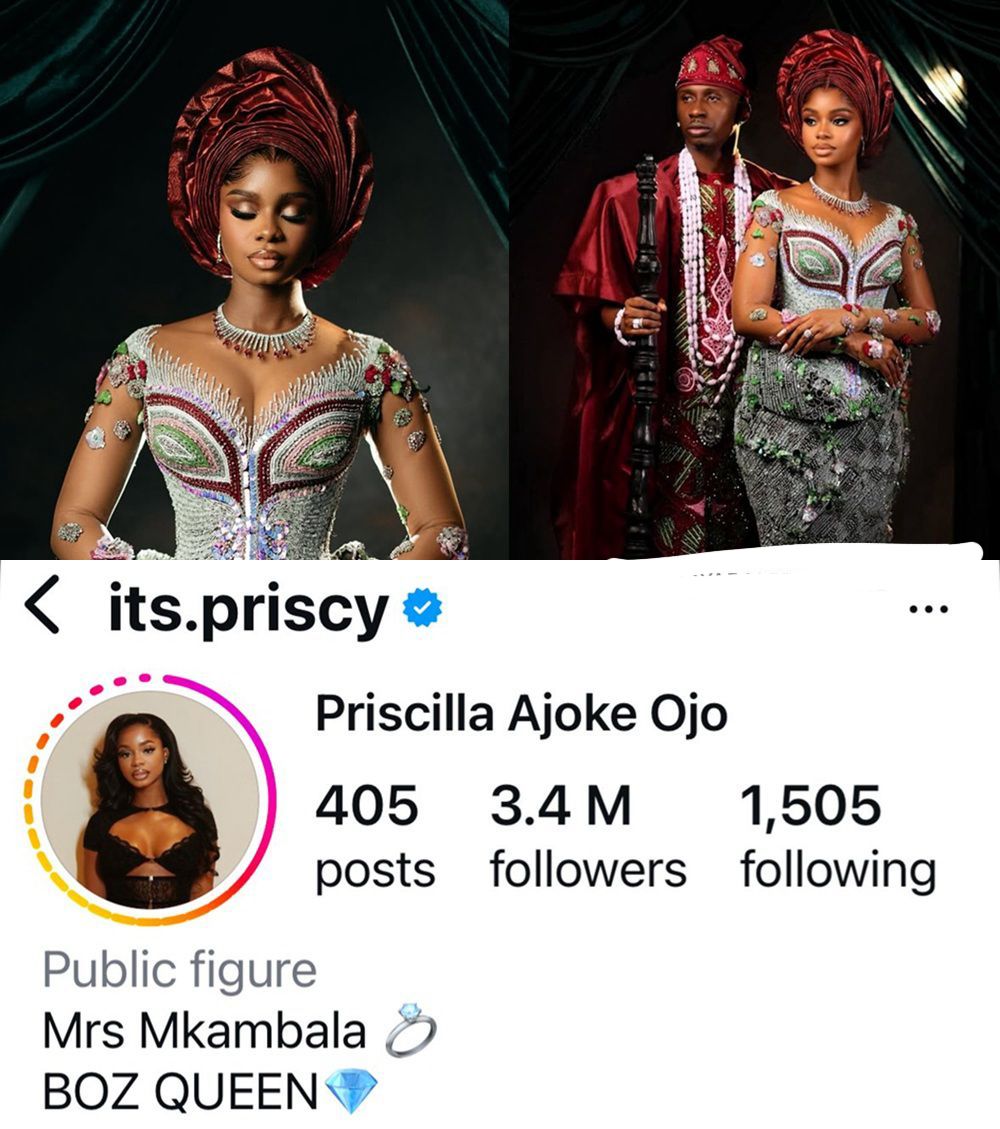
"I Don Re-write Nigerian Folklore: Now Na Big 7 We Get" - Odumodublvck Declares, Adding Rema, Tems, and Asake to the List of Nigeria's Top Artistes

In a bold and unapologetic statement that has taken the Nigerian music industry by storm, rapper Odumodublvck recently declared that he has “re-written Nigerian folklore,” announcing that the country now boasts a “Big 7” when it comes to the most influential and successful artistes in the music scene. The rapper, whose real name is Tochukwu Gbubemi Ojogwu, made this statement public through his social media account, sparking a fiery conversation among fans, critics, and fellow musicians.
The declaration comes at a time when Nigerian music is experiencing an unprecedented level of global recognition. Nigerian artistes have steadily made their mark internationally, with names like Wizkid, Burna Boy, and Davido regularly topping international charts, performing on global stages, and earning Grammy awards. However, Odumodublvck's proclamation introduces a new wave of competition and respect, one that sees a shift in the landscape of Nigerian music.
"Big 7 don put everybody for pressure," Odumodublvck boldly declared in his social media post, referring to the new line-up of the country's most influential musical stars. He named Rema, Tems, and Asake as the key additions to the already established “Big 4” in Nigerian music—Wizkid, Burna Boy, Davido, and Olamide. With these three names now included, Odumodublvck asserts that Nigeria’s musical dominance has expanded, bringing forth a fresh wave of talent and creativity that is now holding the global stage in a headlock.
Rema, whose rise to fame can be attributed to his distinctive sound and breakout hits like "Dumebi" and "Calm Down," has quickly become a global sensation, with his fusion of Afrobeat, trap, and pop earning him millions of international streams. Tems, known for her ethereal voice and collaborations with artists such as Drake on “Fountains” and Wizkid on "Essence," has captured hearts worldwide, winning numerous awards, including a Grammy. Asake, the "Mr. Money" of Nigerian music, has taken the industry by storm with his signature sound, blending Fuji and Afrobeats to create hits that have taken over airwaves both at home and abroad.
The "Big 7" now stands as the ultimate benchmark of success in the Nigerian music scene, a list that Odumodublvck claims he has effectively created, forcing both fans and industry experts to reevaluate the players in the game. For the rapper, the Big 7 isn’t just about popularity; it’s about an artist’s influence, innovation, and undeniable impact on the global stage.
Odumodublvck’s statement has undoubtedly set the industry alight, and his words are not just a matter of personal opinion but a reflection of the reality in the current state of Nigerian music. As he points out, the “game is in a hot meds right now”—meaning the competition has reached a fever pitch. The phrase “Big 7 don put everybody for pressure” suggests that these artistes are now not only setting the trends but also forcing others to level up or risk being left behind.
However, Odumodublvck's declaration doesn’t stop at naming the Big 7. He also takes a subtle jab at those still using outdated "parameters" to measure success. According to him, some still rely on traditional metrics, such as chart positions and radio airplay, to determine success, which he dismisses as being out of touch with the current times. “Na only MUiMU dey use him OGA parameters measure him own success,” Odumodublvck quips, implying that these outdated measures no longer hold true in an era where digital streaming, global tours, and social media presence have changed the definition of success in the music industry.
The rapper’s mention of the “Big 4” and the expanded list to include Rema, Tems, and Asake speaks to the shifting power dynamics in the music industry. As mentioned, Wizkid, Burna Boy, Davido, and Olamide were long considered the “Big 4”—artists who had successfully transcended Nigeria’s borders, building massive international followings. But Odumodublvck’s post acknowledges that there’s now a new generation of stars emerging, and their influence cannot be ignored.
Rema’s meteoric rise with “Calm Down,” which has charted globally and dominated airwaves, solidifies his place as a force to be reckoned with. Tems, whose partnership with global stars has positioned her as one of the most important voices of Afrobeat's international rise, is now a household name. Asake, with his infectious sound and impressive catalogue, has made his mark in ways that are impossible to overlook. Their inclusion in Odumodublvck’s "Big 7" signals the growing influence of these artists within the Nigerian music scene, as well as their undeniable contribution to the Afrobeat movement’s global ascent.
What makes Odumodublvck’s proclamation even more interesting is the context in which it was made. In an era where Nigerian music is breaking barriers and capturing international attention like never before, his words bring into sharp focus the new wave of Nigerian talent. The rapper’s boldness is a direct response to an industry that is constantly evolving, and he recognizes that the game has changed forever. The “Big 7” is a reflection of this new paradigm—a group of artists that are not only popular but also define the sound, culture, and identity of Nigerian music worldwide.
There is also the acknowledgment that the global audience has embraced a broader range of musical styles. While Afrobeat remains the dominating genre, the influence of Nigerian pop, trap, and alternative music has reached new heights. The international acclaim of artists like Burna Boy, who won a Grammy, and Wizkid, who has continued to top global charts, has paved the way for the younger generation, which includes Rema, Tems, and Asake.
However, the rapper’s declaration has not gone without criticism. Some critics argue that the Big 7 is an oversimplification of the industry's dynamic nature and that other artists deserve recognition as well. With the massive influx of talent in Nigeria, it’s hard to argue that the list is anything less than highly subjective. Nevertheless, Odumodublvck’s statement has opened up a larger conversation about the growth and future of Nigerian music, and whether or not the “Big 7” is the definitive list or just a starting point for even greater achievements.
The idea that Odumodublvck has “re-written Nigerian folklore” with his Big 7 is not merely about naming the most popular artists; it’s about acknowledging the cultural shift taking place in the industry. These artists are redefining what it means to be successful in the Nigerian music scene, and Odumodublvck’s statement serves as a reminder of how far the industry has come.
With the Big 7 now in place, there’s no doubt that Nigerian music will continue to dominate the global stage, setting new standards and inspiring generations of artists to come. Whether or not you agree with Odumodublvck’s list, one thing is clear—the Nigerian music industry is in a phase of tremendous growth and innovation, and these seven artistes are undoubtedly at the forefront of this revolution.


